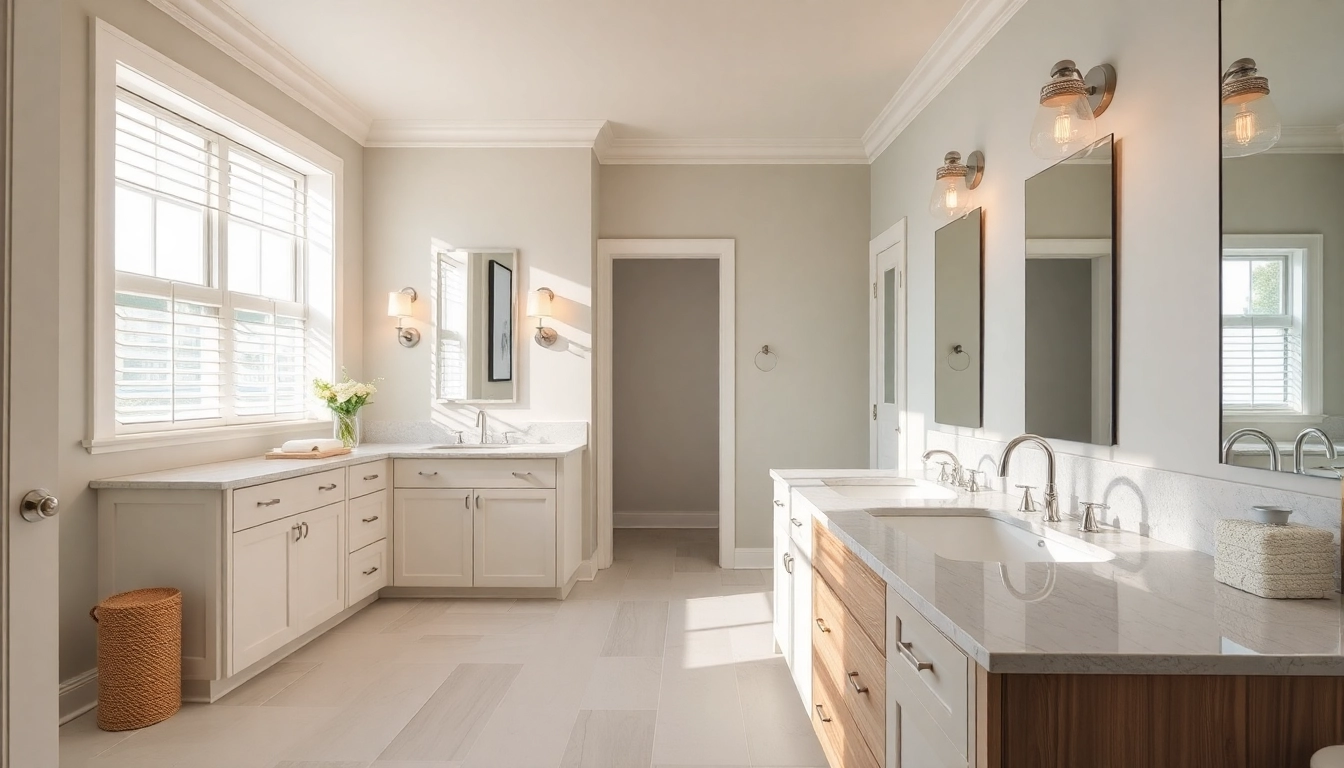Understanding the Role of a Bathroom Remodeling Contractor
When planning your dream bathroom, the role of a Bathroom Remodeling Contractor is pivotal. They serve as the project manager, coordinating every step of the remodeling process from design to completion. Their expertise encompasses a range of tasks, making them essential in transforming your visions into reality.
What Does a Bathroom Remodeling Contractor Do?
A bathroom remodeling contractor is responsible for overseeing the entire bathroom renovation project. This includes:
- Consultation: Understanding the homeowner’s needs, preferences, and budget.
- Design: Collaborating with designers or architects to create functional and aesthetically pleasing layouts.
- Permitting: Acquiring necessary permits to comply with local building codes.
- Hire and Manage Subcontractors: Employing skilled laborers such as plumbers, electricians, and tile setters.
- Schedule Management: Ensuring the project stays on schedule and within budget.
- Quality Control: Monitoring the work to ensure it meets specifications and quality standards.
The Benefits of Hiring a Professional
While some homeowners may consider DIY options, hiring a professional bathroom remodeling contractor comes with several advantages:
- Expertise: Professionals have experience and knowledge of the best practices for successful remodeling.
- Time-Saving: They handle all aspects of the project, allowing homeowners to focus on their daily lives.
- Cost-Effective: Experienced contractors know how to manage a budget and can help prevent unnecessary expenses.
- Access to Resources: Contractors have established relationships with suppliers and can procure materials at a lower cost.
- Warranty and Insurance: Hiring a contractor means the work is likely covered by a warranty, providing peace of mind.
Key Skills to Look for in a Contractor
When searching for the right bathroom remodeling contractor, consider the following skills:
- Communication: A contractor must be able to communicate effectively with both clients and subcontractors.
- Project Management: They should have strong organizational skills to manage timelines and budgets efficiently.
- Problem-Solving: Remodeling can present unexpected challenges, and a good contractor should be adept at finding solutions.
- Technical Skills: An understanding of plumbing, electrical systems, and building codes is essential.
- Design Sense: Creativity and an eye for aesthetics can greatly enhance the outcome of a remodel.
Preparing for Your Bathroom Remodel
Setting a Budget for Your Bathroom Remodeling Project
Establishing a budget is the first and most crucial step in the remodeling process. Here are some tips to consider:
- Research Costs: Investigate the average costs for different remodeling options to get a sense of what to expect.
- Prioritize Needs vs. Wants: Identify what elements are necessary for your remodel versus those that are purely aesthetic.
- Include a Contingency Fund: Set aside 10-20% of your budget for unexpected expenses.
- Consult with Your Contractor: An experienced contractor can provide budget estimates based on your vision and local market rates.
Design Ideas and Inspirations
Creating a functional yet stylish bathroom requires some inspiration. Consider these ideas to ignite your creativity:
- Modern Minimalism: Focus on clean lines, neutral colors, and clutter-free spaces to achieve a contemporary look.
- Vintage Charm: Incorporate classic fixtures and tiles to evoke an old-world feel.
- Eco-Friendly Materials: Opt for sustainable products, such as reclaimed wood and energy-efficient fixtures.
- Smart Technology: Integrate smart home technology for improved functionality and convenience.
- Luxury Elements: Consider adding spa-like features such as heated floors or rainfall showerheads.
Choosing the Right Materials
The choice of materials can significantly influence the style and durability of your newly remodeled bathroom. Here are a few tips:
- Tile: Choose water-resistant tiles that are both stylish and durable, such as porcelain or ceramic.
- Countertops: Select materials like quartz or granite for their strength and low maintenance.
- Lighting: Incorporating various light sources can enhance the ambiance and functionality of the space.
- Paint: Use moisture-resistant paints to withstand bathroom humidity.
- Fixtures: Invest in high-quality plumbing fixtures to ensure longevity.
Steps to Find the Right Bathroom Remodeling Contractor
Researching Local Contractors
Finding the right contractor is crucial to the success of your bathroom remodel. Begin your search with the following steps:
- Online Reviews: Browse platforms like Yelp and Houzz to find top-rated contractors in your area.
- Professional Associations: Look for contractors who are members of recognized industry organizations.
- Word of Mouth: Ask friends, family, and neighbors for recommendations based on their experiences.
- Portfolio Review: Examine a contractor’s previous work to assess their style and quality standards.
Asking the Right Questions
Engage potential contractors with specific questions to evaluate their suitability. Key inquiries include:
- How long have you been in business?
- Can you provide references from past clients?
- What is your estimated timeline for this project?
- How do you handle changes or unexpected issues during the remodel?
- Do you have licensing and insurance?
Checking References and Ratings
Before making a final decision, always check references and contractor ratings. Here are some steps to follow:
- Client Feedback: Reach out to provided references to gain insight into their experiences.
- Online Ratings: Visit websites like Better Business Bureau and Angie’s List for contractor ratings and reviews.
- Visit Past Projects: If possible, visit a completed project to assess quality in person.
Common Bathroom Remodeling Challenges and Solutions
Dealing with Unexpected Costs
Unexpected expenses are common during remodeling projects. Here’s how to prepare:
- Establish a Buffer: Set aside 10-20% of your total budget for contingencies.
- Inspect Existing Structure: Have a thorough inspection done before starting the remodel to identify potential issues.
- Communicate with Your Contractor: Ensure your contractor informs you of any issues as they arise and discusses solutions.
Communicating Effectively with Your Contractor
Effective communication with your contractor can prevent misunderstandings and enhance project outcomes. Consider these tips:
- Set Clear Expectations: Discuss your vision and all project details upfront.
- Regular Updates: Schedule regular check-ins to review progress and discuss any concerns.
- Document Everything: Keep a record of all communications to refer back to if needed.
Managing Timelines and Expectations
Timeliness and expectations can often create tension during remodeling. To handle this effectively, follow these steps:
- Discuss Timelines: Clearly outline the expected timeline for each stage of the project.
- Be Flexible: Be prepared for potential delays due to unforeseen circumstances, and adjust expectations as necessary.
- Celebrate Milestones: Acknowledge your contractor’s work as key phases are completed, which fosters a positive working relationship.
Measuring Success After Your Bathroom Remodel
How to Evaluate the Quality of Work
After the completion of your remodel, assessing the quality of work is vital. Here are some pointers:
- Visual Inspection: Check for any visible imperfections in tiles, paint, and fixtures.
- Functional Tests: Test all plumbing and electrical fixtures to ensure they operate correctly.
- Material Quality: Evaluate the materials used to ensure they meet your expectations and are of high quality.
Gathering Feedback from Family and Friends
After your remodel, it’s important to seek feedback from those who will be using the bathroom regularly. Consider these steps:
- Ask Specific Questions: Solicit opinions on functionality, style, and comfort.
- Conduct an Observation: Observe family and friends as they use the new space to see how it meets their needs.
Maintenance Tips to Keep Your New Bathroom in Top Shape
After investing in a beautiful new bathroom, maintaining its condition is crucial. Follow these maintenance tips:
- Regular Cleaning: Set a routine for cleaning tiles, fixtures, and surfaces to prevent mold and grime buildup.
- Monitor Plumbing: Check for leaks or water damage regularly to address problems early.
- Refresh the Space: Update decor periodically to keep the bathroom looking fresh and inviting.



